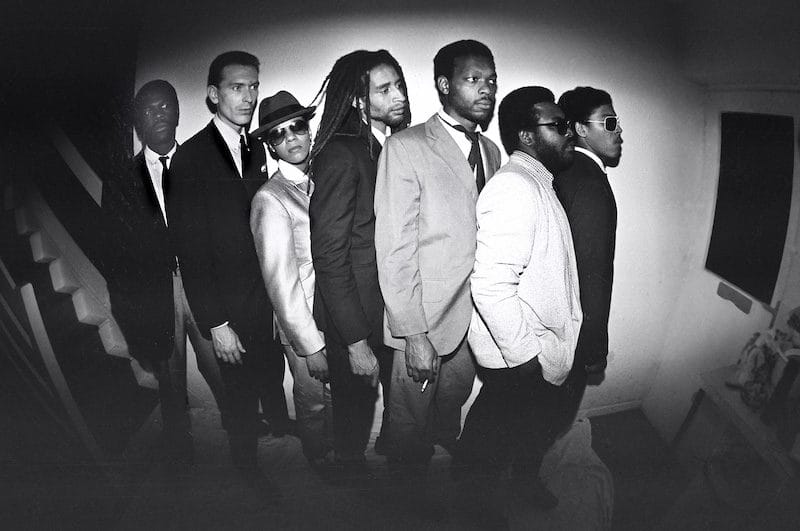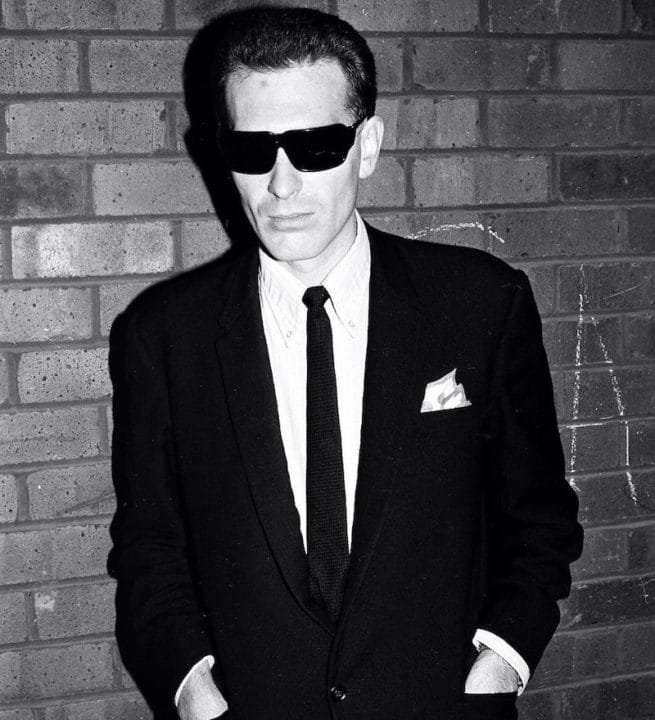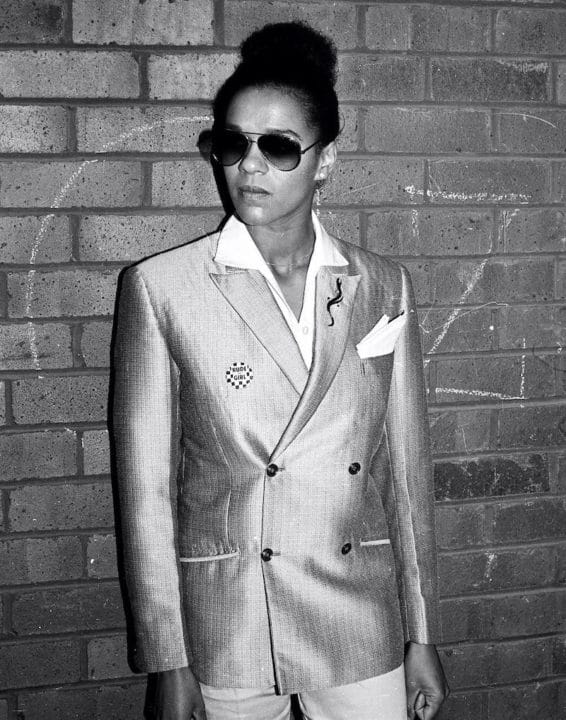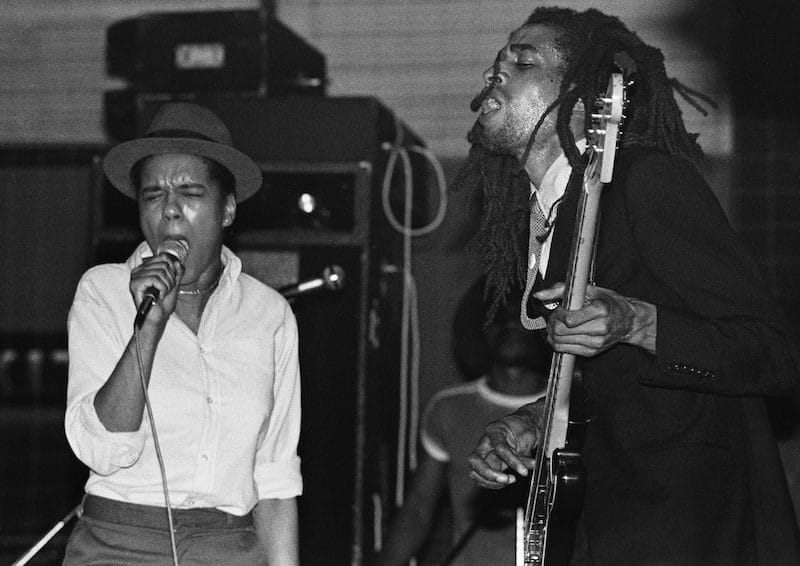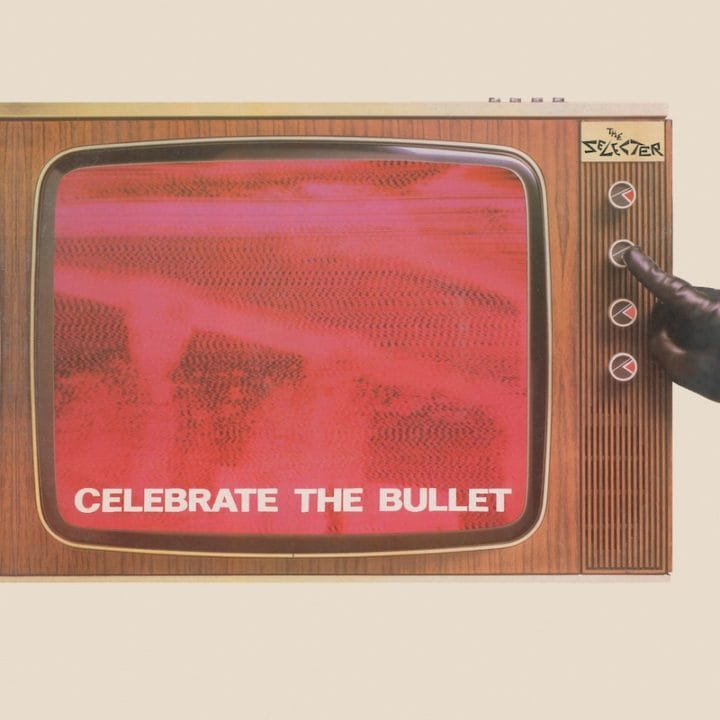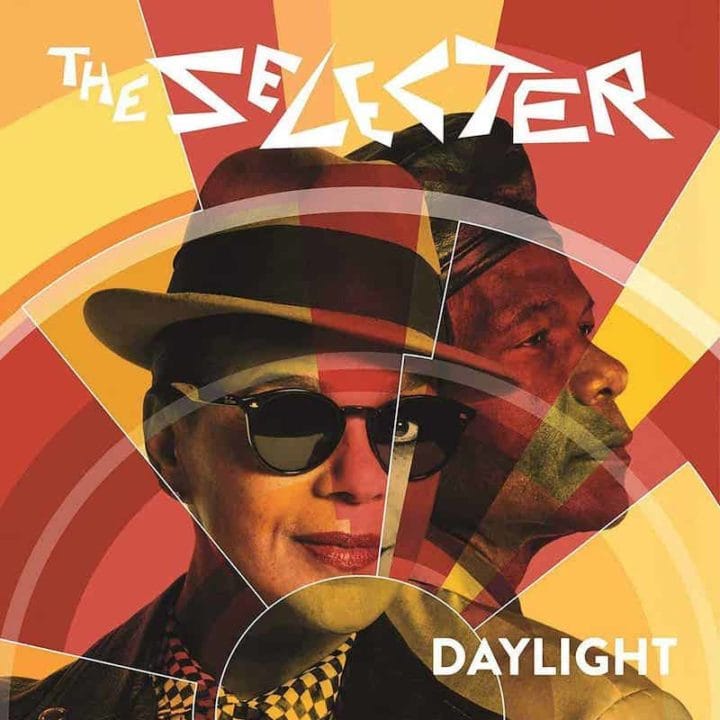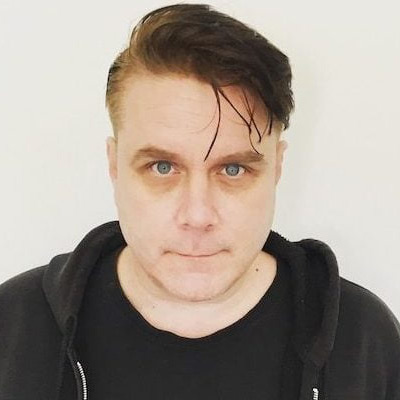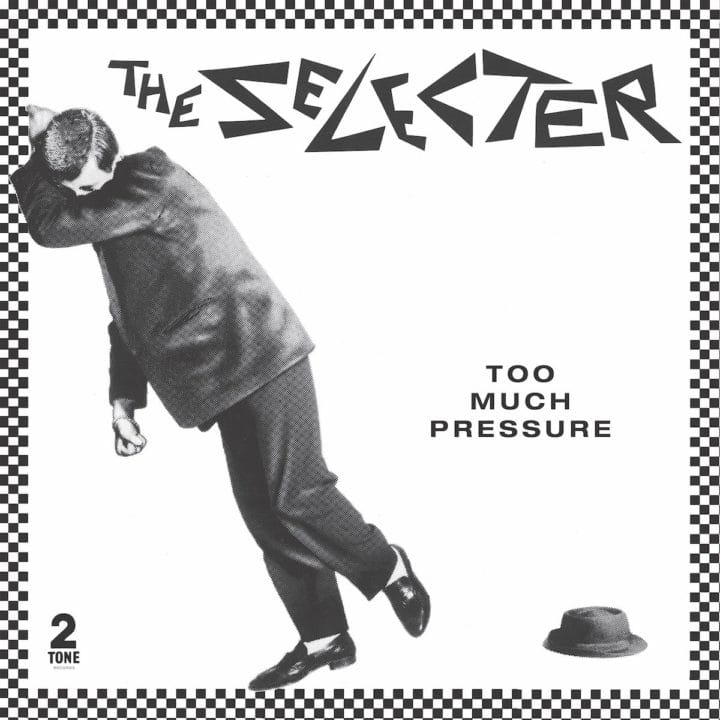
In 2021, as Chrysalis Records continued their celebration of 2 Tone with the remastered release of Too Much Pressure, the seminal debut album by The Selecter, Classic Pop met key players Neol Davies, Arthur ‘Gaps’ Hendrickson and Pauline Black to discover why the band are more than mere Three Minute Heroes…
While it might have been The Specials that sparked the UK ska revival in the late 70s, labelmates The Selecter were always right by their side. Rather than slip into the shadows of Jerry Dammers’ charttopping hitmakers, it is the seven-piece Coventry collective formed by guitarist Neol Davies and co-fronted by Pauline Black and Arthur ‘Gaps’ Hendrickson, that many consider to be the quintessential 2 Tone act.
Completed by Compton Amanor on guitar, Hammond organ player Desmond Brown, bassist Charley Anderson and drummer Charley ‘H’ Bembridge, the group was a unique hybrid that would go on to deliver one of the most iconic albums of the 1980s. But before there was a band, there was a song…
The Selecter
“My first clear memory of hearing reggae was around 1968,” recalls Neol. “I had just left school and knew I didn’t want to work in a factory or have a proper job. I was gigging in a blues-rock trio and the three of us were listening to the car radio when Desmond Dekker’s Israelites came on and it blew my mind. As far as white people were concerned, reggae was very much an underground phenomenon at the time.
“My initial introduction to it all came after a chance encounter with Silverton Hutchinson, the original drummer in an early incarnation of The Specials. We’d been childhood friends and he suggested I came down to the Holyhead Youth Centre where he hung out and jammed reggae with a group of local musicians. That was a huge turning point for me, because it was there that I first met bassist Charley, Desmond, and Gappa Hendrickson who was chipping away on a guitar.”
Train To Skaville
“Bob Marley was a big influence,” says vocalist Gaps. “I saw him with his guitar and wanted to learn. I was born in Saint Kitts, a tiny Caribbean island, so his music resonated with me. While my mum and dad mainly listened to Jim Reeves and Pat Boone records, there was this one song we had called Time And Tide by Sugar ’N’ Dandy, which I loved. I wanted to hear more and bought Train To Skaville by The Ethiopians.
“I had moved to England in 1964 and settled in Luton but was attracted to Coventry after visiting a friend one holiday. It was during my stay that I saw black and white people mixing as friends for the first time. After meeting people like Charley, Desmond and Lynval Golding, guys just like me who liked the same music, I decided to make the move. Back then the city had a small black community, so everyone knew each other. There was a lot of intermingling between bands at the Holyhead and eventually Hard Top 22 formed.”
“Those jam sessions were very significant,” Neol continues. “I was performing in Nite Train, a covers group that was fronted by local soul singer Ray King, which also featured Jerry Dammers. He and I were both aware of punk happening and I believe it was during this time that he first started to develop his idea for 2 Tone.
“We’d both started writing our own songs and, in 1977, I lent Jerry my Revox tape recorder so he could make some demos for a new project he was working on.”
An Affair To Remember
“I rehearsed with Jerry’s new outfit a couple of times,” says Neol. “Silverton played drums and Horace Panter bass, but it was clear Jerry had a steadfast idea of what he wanted to do. I think we were a bit too different to be in the same band, so Lynval was drafted in and I moved on.
“One of our mutual friends, Brad [John Bradbury], worked in the local Virgin Records. I was hanging out with him upstairs at the shop when he played me Watching The Detectives by Elvis Costello.
“It sounded great and Brad suggested we made a record. We had no idea how we were going to make a record, but an old friend of mine, Roger Lomas, had built a basic studio in his back garden. Brad played the drums while I laid down the bassline and guitar for a track that I was working on called Kingston Affair. Brad’s brother-in-law, Barry Jones, came in to add trombone.”
Meanwhile, Dammers was putting the finishing touches to his newly-formed Coventry Automatics and asked Neol if he could borrow Brad. Jerry’s next favour would prove rather special…
Special Effect
“It was about one year after recording Kingston Affair when Jerry asked if he could use it on the flipside of a single that he was releasing,” remembers Neol. “I couldn’t believe my luck. His band had now fully morphed into The Specials and they’d just recorded Gangsters. I’d gone off the name Kingston Affair so changed it to The Selecter by The Selecter.”
A limited run of 5,000 copies of the double A-side was distributed by Dammers’ embryonic 2 Tone label in May 1979.
Neol explains: “John Peel had a hugely influential two-hour radio show around this time and Jerry sent him a copy of the record. We tuned in hoping he’d play Gangsters and I couldn’t believe my ears when I heard The Selecter. After he played it, Peel said: ‘That’s The Selecter by The Specials.’ Well, my elation quickly turned to excited panic!
“A phone line had just been connected to my flat, so I got a number for the BBC and asked to be connected through to someone working on the show. To my absolute astonishment I was put straight through to the man himself. I garbled something about 2 Tone, The Specials, Gangsters and The Selecter, and he went on to correct himself and played both sides that night.”
The Special AKA Gangsters Vs The Selecter was given a full release two months later and peaked at No.6 in the charts. As interest surrounding The Specials and 2 Tone grew, Neol knew the name The Selecter had been established, so he reached out to his old friends in Hard Top 22. Securing Charley, Compton and Gaps, the band was nearly complete.
Original Rude Girl
Born in 1953 to Anglo-Jewish/Nigerian parents, Pauline Black was adopted by a white, working-class family in Romford, Essex. Always feeling estranged, she discovered reggae while at school.
“In the fifth form there was a small number of skinhead pupils from Dagenham,” says Pauline. “I remember there was a Dansette turntable in the common room and sometimes they would play their records. I had an afro and was into all things ‘Black is beautiful’ at the time. However I was fascinated by these white skinhead girls, with their feathery haircuts, dancing in formation. They looked so cool and I really liked the music. So, yes, I was the black kid who was introduced to Jamaican ska by white kids… I then promptly moved to Coventry and became a hippie.
“I had my future mapped out as a radiographer at Coventry’s Walsgrave Hospital and music was just a hobby. Back then, if you were female and fancied yourself as a guitar-playing songwriter, the only place that you could perform was folk clubs.
“I always hoped that somebody might notice that I bore a passing resemblance to the wonderful Joan Armatrading, but it was nothing serious.
“I was writing music with my friend Lawton Brown, who knew all the members of Hard Top 22. We were rehearsing in the back room of a pub in Foleshill, with Desmond and Charles, when Lynval of The Specials turned up. At the end of the session, he said to Desmond, H and myself: ‘I think you should come and meet this guy’… that guy was Neol Davies.”
2 Tone Takeover
“I don’t think, when The Selecter formed, we thought anything was actually going to come of it,” continues Pauline. “We really were just flying by the seats of our pants during those early gigs. Gaps and I would tape lyrics to the front of the stage and race around trying to read the words, people used to say: ‘Well, aren’t they energetic.’ But we all performed with such energy, it was just the natural thing to do. I was still working as a radiographer when Jerry did a deal with Chrysalis enabling 2 Tone to release records by The Specials and any other bands that took his fancy.”
“It was exciting beyond belief,” adds Neol. “We recorded On My Radio, with the B-side Too Much Pressure and went out on the 2 Tone Tour with Madness and The Specials. There was also that one episode of Top Of The Pops, when all three of us appeared. 2 Tone was everywhere!”
“I could see 2 Tone mania developing at our Electric Ballroom gig with The Specials,” concurs Gaps. “It was packed and the whole place was a-rootin’-and-a-tootin’. When The Specials played the whole building was shaking. That 2 Tone Tour was like the best school trip and we had a lot of good times.”
On My Radio
On My Radio reached No.8 and stayed in the chart for nine weeks. Dammers asked The Selecter to record an album and, having booked themselves into Coventry’s Horizon Studios between December 1979 and January 1980, they recorded Too Much Pressure with unfamiliar producer Errol Ross.
Having expressed disappointment towards the LP’s sound in the past, Pauline admits: “That was a discussion we had 40 years ago. The songs are superb and people around the world think it sounds wonderful, so I’m not about to pop their bubble.”
“There was a lot of inexperience on our side with that original recording,” offers Gaps. “While I think it could’ve sounded better, the quality of the songs stands true.”
“We went into the studio to try to capture the essence of our gigs,” adds Neol. “It has been great to take the original tapes and make the album sound as good as possible now.”
Ska-Fest At Tiffany’s
The band’s magnificent live sound is highlighted on the new remastered Too Much Pressure CD collection. The concert material recorded at Tiffany’s in Coventry (29 November 1979) and Hemel Hempstead (28 February 1980) is a blistering blitzkrieg guaranteed to get you skanking around your front room.
Neol said: “To hear the band recorded at those early concerts, after 40 years, was emotional. Just before I heard the remastered collection, I was going through my archives and listened to a tape which had part of a concert on it. Well, it turned out the reel was labelled incorrectly, and it was the same Tiffany’s show we’re releasing now. When I heard it for the first time, I don’t mind admitting I cried. Fans are going to love it.”
“When I heard the live recordings on this reissue, I thought wow!” offers Gaps. “Technology today is incredible, and we sound amazing… well, we were!”
“It’s a pretty long time after the event and those live tracks are pretty rare for us, too,” adds Pauline. “I’m not one to retread past glories, but The Selecter has always been a phenomenal live band. We sounded different and we looked different – there was six black people and one white person, which was something of a rarity, and who else had a Rasta guy in their band wearing a tonic suit or a rude girl singing… well, the term ‘rude girl’ hadn‘t even been invented until I turned up. We really were a very unique band.”
Electric Dreams
Whatever the band might’ve thought of their studio debut’s sound on its release in 1980, fans and critics fully embraced what they heard. Too Much Pressure spent more than three months in the charts, peaking at No.5. Garry Bushell, rated the album five stars out of five in Sounds, concluding: “One can’t help but sympathise with the exhausted rude boy featured on the simple black and white cover. Music like this is both eminently enjoyable and supremely knackering.”
“We made it to the top of the charts in split-second time,” acknowledges Pauline. “However, it was the fruition of a lot of work. When it all came together, I certainly think that everybody was ready musically… maybe not mentally.” [laughs]
“A hell of a lot of work, effort, blood, sweat and tears went into making it all happen,” agrees Neol. “I was so proud of what we achieved… and then we split up!”
Three Minute Heros
After scoring further hits with Three Minute Hero and Missing Words, The Selecter returned to the studio to record a new single. The Whisper would be the last track recorded by the original lineup, 18 months after the band had formed, both Brown and Anderson left.
Signing with parent label Chrysalis, bad timing consistently plagued second album Celebrate The Bullet. Released as a single on 6 February 1981, the title track was swiftly banned by BBC Radio 1 due to the murder of John Lennon. The LP’s release was blighted further following an attempted assassination on US President Ronald Reagan. No further singles were released, and the album stalled at No.41. “On the day Chrysalis dropped us,” reflects Neol, “I remember walking down the grand staircase of their Oxford Street office, just as Spandau Ballet passed me on their way up… I knew it was all over.”
The music and colour of the New Romantics could not be further removed from the politically charged, black and white, of 2 Tone. “Back then, image was integral to the music that you were making,” Pauline shrewdly points out. “We were all like little tribes and everyone had a different look. Our image was very cool, very crisp, and very accessible. Kids could go to Oxfam and find an old tonic suit, a pair of monkey boots, some old guy’s trilby or a Fred Perry shirt, nobody had to cut up their mum’s curtains to make a frock or a kilt or whatever.”
Fighting The Good Fight
Whether it was the sharp look of 2 Tone, the thrilling live shows, or the infectious tunes, The Selecter’s music and message of unity has rippled down through the generations.
“We had every faith in what we were saying,” confesses Neol. “We all tried our best and it’s clear what we stood for. The essence of music is to communicate emotion. From blues, jazz, and reggae to punk, 2 Tone and hip-hop, music with feeling will always be talked about.”
It is a sentiment echoed by Gaps: “I came to England when I was 13 and I’ve seen a lot of bad things happen. To echo Bob Marley, I say: ‘He who feels it, knows it’. We challenged racism, sexism, hopelessness, and all prejudices. However, we never wanted to push things in people’s faces, we wanted them to make up their own minds.
“It’s an honour and a pleasure to be here talking about what we did. Pauline and I continue to tour all over the world. Everywhere we go we see different people mixing, having fun, and singing along – it’s inspiring. This past year has given me time to recuperate, but now I’m raring to go again.”
Championing The Underdog
“It’s very humbling to see people from all ages, 16 through to 60, at our shows,” agrees Pauline. “Seeing the younger generation is always a thrill. Not because one wants to appear hip, it’s because of the ideas that we’re communicating. To invest in The Selecter, you’ve actually got to invest in the ideas, too.
“I’m not really into legacies but I would definitely like to be remembered for making some good music – and fighting for the underdog. If there’s any legacy at all, it would be that we can speak for those who don’t have a voice. The 2 Tone message is still relevant, and racism hasn’t gone away, but I do think things have moved on, particularly over the past year. I think there’s been a real kick back against everything, Black Lives Matter is now out in the open, and a discussion has started.
“People wilfully denying there is a problem, is the problem. You know you’ve got a problem when people complain about the number of black people appearing in a TV advertisement. There’s a raging global pandemic and you’re getting upset about that?… Talk about too much pressure, goodness me!”
Following The Selecter’s split, Neol continued to write, record and play shows, while Pauline enjoyed an award-winning acting career and wrote Black By Design, her critically-acclaimed autobiography. In 2010, she returned to The Selecter name in earnest after it was suggested she recorded new music to coincide with her book. With Gaps by her side, Pauline, and a new-look Selecter, have made a string of albums, including Subculture (2015) and 2017’s Daylight. In 2023, they released their excellent Human Algebra LP. Given the infectious bond the pair share on stage, Classic Pop asks what the duo thinks of each other:
Gaps On Pauline
“Well, what can I say about Pauline – she’s one astute woman. I’ve never known anybody else quite like her. She constantly amazes me and sometimes I watch her and think: ‘Aye, Gaps you’re in good company here!’ She’s tough, but I do feel like a big brother and I always know that when I get things wrong, she can straighten it.”
Pauline On Gaps
“I think we have a very deep mutual respect. We’ve known each other for more than 40 years and there’s never been a time where I’ve felt like Gaps hasn’t got my back. I very much enjoy what he brings to the party. It’s hard being out there at the front and it takes a lot of energy to buoy everybody up, but Gaps does such a splendid job. He’s from the Caribbean and his formative years were very different to mine, but put us together and you’ve got two halves that make up a wonderful whole.”
In June 2024, Gaps died aged 73. The Coventry ska band announced that the vocalist, who was diagnosed with cancer in 2023, passed after a short illness.
For further information click here
Read Our Essential Guide – The Best Of 2 Tone
Classic Pop may earn commission from the links on this page, but we only feature products we think you will enjoy.

